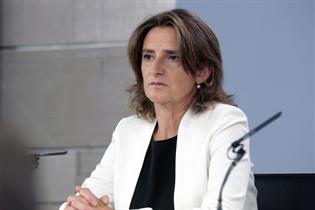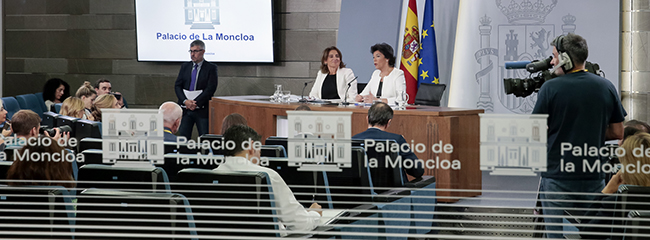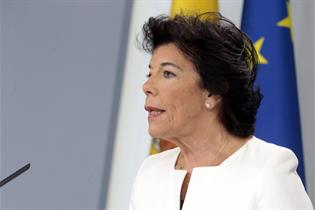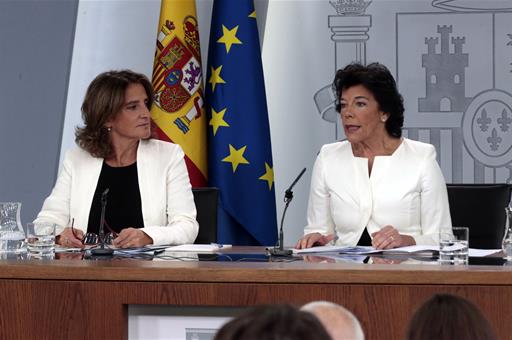Council of Ministers
Government approves National Programme to Control Atmospheric Pollution
Council of Ministers - 2019.9.27
Moncloa Palace, Madrid
The Council of Ministers approved the first National Programme to Control Atmospheric Pollution (Spanish acronym: PNCCA) which will lead to a significant reduction in the levels of pollution of compounds and substances that are harmful to health.
The Acting Minister for Ecological Transition, Teresa Ribera, highlighted that as a result of this agreement, Spain will comply with its obligations to the European Union on atmospheric pollution for 2030.
Teresa Ribera explained that the programme strengthens the system to monitor emissions and their impact on health and on eco-systems. It also establishes 57 cross-cutting measures aimed at - in the decade from 2020 to 2030 - Spain being able to meet its target of reducing a series of pollutants ranging from nitrogen dioxide to greenhouse gases and volatile compounds and particulates.
According to the minister, the programme is a tool that goes hand-in-hand with the atmospheric pollution plans", already adopted by the public authorities. It contains initiatives related to agricultural work, to monitoring activities that generate ammonia and to the use of manure and fertilisers. It also includes measures relating to mobility, the energy sector and other questions that may affect human health, such as the use of residential log fuels and the use of paints and varnishes.
The document, which will be sent to the European Commission and to the European Environment Agency (EEA), is in line with the energy and climate policies defined in the draft National Integrated Energy and Climate Plan 2021-2030, sent to the Commission in February.
Teresa Ribera highlighted the government's commitment to the 2030 Agenda and to compliance with the 17 Sustainable Development Goals as was stressed at the Climate Summit, which the Acting President of the Government, Pedro Sanchez, and several members of the government took part in this week in New York.
Global actions to improve climate
T Pool Moncloa/JM Cuadradohe acting minister claimed that the Climate Summit has demonstrated that actions adopted to protect the environment must be global and involve the participation of companies, governments and citizens, "each one in line with their level of responsibility".
Pool Moncloa/JM Cuadradohe acting minister claimed that the Climate Summit has demonstrated that actions adopted to protect the environment must be global and involve the participation of companies, governments and citizens, "each one in line with their level of responsibility".
She also stressed the importance of "this being heard in the streets", particularly by young people, who are not prepared to accept the legacy that adults unfairly pass on to them". In this regard, she mentioned the strikes and demonstrations called by various organisations throughout the country to call for emergency measures to halt the climate crisis.
The acting minister recalled that the government has presented the results of the first report to monitor the Implementation Plan of the Sustainable Development Goals, speeding up the deadlines for compliance. "It is essential to continue to activate measures to reduce greenhouse gases, combined with measures on adaptation to climate change", argued Teresa Ribera.
Teresa Ribera also underlined that, in the Climate Action Summit, Spain promoted, together with Peru, the social aspects on the work on climate. These initiatives, she argued, "must be based on a just transition from the current employment model to a carbon-free economic model that is resilient to the effects of climate change", and its effects on grounds of gender.
For her part, the Acting Minister for Education and Vocational Training, and Government Spokesperson, Isabel Celaá, pointed out that Pedro Sánchez, in his speech at the Summit, expressed Spain's commitment to provide 150 million euros in funding over the next four years to the Green Climate Fund allocated to help developing countries mitigate the effects of climate change.
188 million euros to hire researchers
 Pool Moncloa/ J.M. Cuadrado
Pool Moncloa/ J.M. Cuadrado
The government approved two calls for proposals for subsidies to hire researchers at universities, public research centres, and private not-for-profit research centres.
Isabel Celaá underlined that "science is necessary for a country that wants to develop and head up knowledge", and hence these subsidies have been increased by 15 million euros on last year and amount to 188.3 million euros.
The first call for proposals will allocate 109.5 million euros to research contracts for post-graduate training. The other 788 million euros will allow universities and research centres to hire 850 researchers on post-graduate programmes.
19 helicopters to fight wildfires
The Council of Ministers authorised the purchase of 19 helicopters to fight wildfires for the sum of 74.5 million euros, for the campaigns in the summer of 2020 and 2021 and winter of 2022.
These resources, said Isabel Celaá, help serve to support regional governments in putting out wildfires, together with other aircraft from the Ministry of Agriculture, Fisheries and Food.
Resolutions of Regional Parliament of Catalonia challenged
 Pool Moncloa/JM CuadradoIsabel Celaá announced that the government will challenge three of the resolutions approved by the Regional Parliament of Catalonia on Thursday. Once they are officially published, the State legal services will initiate proceedings, explained Isabel Celaá.
Pool Moncloa/JM CuadradoIsabel Celaá announced that the government will challenge three of the resolutions approved by the Regional Parliament of Catalonia on Thursday. Once they are officially published, the State legal services will initiate proceedings, explained Isabel Celaá.
The Acting Government Spokesperson summarised the content of these resolutions, the first of which urges the issue of an institutional response and calls for an amnesty if the Catalan politicians that are in prison awaiting the ruling of the Supreme Court are finally convicted. The second encourages self-determination and the third calls for the Guardia Civil to be pulled out of Catalonia. "These clearly breach regional jurisdiction and this government will not allow any attack on the Statute of Autonomy of Catalonia or on the Constitution", claimed Isabel Celaá.
Isabel Celaá advocated co-existence as opposed to division and the application of the law as opposed to "those who want to tread the path or disobedience and even possible violence". In this regard, she praised the work of the Guardia Civil in maintaining citizen security which led to the arrest this week of several people in Catalonia for their alleged involvement in criminal actions.
As regards these arrests, the Acting Government Spokesperson objected to the statements made by the President of the Regional Government of Catalonia, Quim Torra, "accusing the State of seeking to criminalise pro-independence supporters", and called for respect for the separation of powers as a fundamental principle of the rule of law. "These people should answer for these actions before the justice system", she said.
Isabel Celaá reiterated that the Constitution "is the common tool for dialogue" and that dialogue is the solution to "a problem that may swallow up a generation of Spaniards and Catalans in a cycle of constant division".
Exhumation of remains of Francisco Franco
Isabel Celaá described the Supreme Court ruling as a "victory for Spanish democracy", which backed the government's decision to exhume the remains of the dictator, Francisco Franco, from the Valley of the Fallen and transfer them to Mingorrubio cemetery - El Pardo (Madrid).
Isabel Celaá recalled that the government initiated these proceedings following a non-binding motion approved by the Lower House, "with no vote against" in May 2017.
Isabel Celaá explained that, once the government receives official notice of the ruling, it will agree on a new date for the exhumation and reburial which will be performed "with decorum, discretion and in a dignified fashion", she reiterated.
Non official translation





